| Srl | Item |
| 1 |
ID:
104260
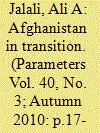

|
|
|
| 2 |
ID:
123044
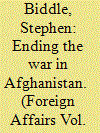

|
|
|
|
|
| Publication |
2013.
|
| Summary/Abstract |
International forces in Afghanistan are preparing to hand over responsibility for security to Afghan soldiers and police by the end of 2014. U.S. President Barack Obama has argued that battlefield successes since 2009 have enabled this transition and that with it, "this long war will come to a responsible end." But the war will not end in 2014. The U.S. role may end, in whole or in part, but the war will continue -- and its ultimate outcome is very much in doubt.
|
|
|
|
|
|
|
|
|
|
|
|
|
|
|
|
| 3 |
ID:
141473
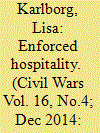

|
|
|
|
|
| Summary/Abstract |
While local mission legitimacy has prompted intense political and academic attention in the context of peace operations, our grasp of how host citizens understand the legitimacy of international troops remains limited. This article explores how Afghan citizens perceive the legitimacy of International Security Assistance Force (ISAF) troops. A qualitative analysis of in-depth interviews and focus group discussions with citizens in Kabul deepens our understanding of how ideational and security-related concerns interact and shape local perceptions of legitimacy through two oppositional discursive frames: a liberation frame and an occupation frame. The findings suggest that local mission legitimacy builds on the perceived will and capacity of ISAF troops to help and protect Afghans in ways that are in accordance with Afghan, most notably Islamic, ways of life. The article concludes that ISAF troops are widely perceived to have failed on both ideational and security-based grounds.
|
|
|
|
|
|
|
|
|
|
|
|
|
|
|
|
| 4 |
ID:
133992
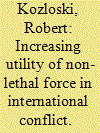

|
|
|
|
|
| Publication |
2014.
|
| Summary/Abstract |
Since the end of the Cold War, the United States has attained mixed results using the traditional instruments of power in pursuit of foreign policy objectives. In the future these instruments may prove even less effective because of domestic problems and changes in the geopolitical environment. Advanced military capabilities enabled by emerging technology may provide policymakers with broader options and greater utility when coercion is required in international relations. The application of non-lethal force is not a substitute for war but an effective lever to consider in future conflict. This article proposes several concepts: digital blockade, conflict termination, wide-area denial, and offshore control, which could be used during future state-level conflict. While these emerging capabilities offer great promise, they are not a panacea. Policymakers and military leaders must fully understand the conditions in which these capabilities provide maximum effectiveness, as well as overcoming legal barriers and contending with the problem of escalation.
|
|
|
|
|
|
|
|
|
|
|
|
|
|
|
|
| 5 |
ID:
005319
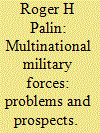

|
|
|
|
|
| Publication |
London, Oxford Univ. Pr., 1995.
|
| Description |
ix,84p.
|
| Series |
IISS, Adelphi Paper;294
|
| Standard Number |
0-19-828025-4
|
|
|
|
|
|
|
|
|
|
|
|
Copies: C:1/I:0,R:0,Q:0
Circulation
| Accession# | Call# | Current Location | Status | Policy | Location |
| 036550 | R 355.357/PAL 036550 | Main | On Shelf | General | |
|
|
|
|
| 6 |
ID:
005211
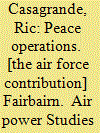

|
|
|
|
|
| Publication |
Fairbairn, Air Power Studies Centre, 1994.
|
| Description |
40p.
|
| Series |
Air Power Studies Centre; no.27
|
| Standard Number |
0642222169
|
|
|
|
|
|
|
|
|
|
|
|
Copies: C:1/I:0,R:0,Q:0
Circulation
| Accession# | Call# | Current Location | Status | Policy | Location |
| 036408 | 358.413560994/CAS 036408 | Main | On Shelf | General | |
|
|
|
|
| 7 |
ID:
102992
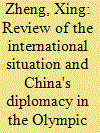

|
|
|
| 8 |
ID:
075222
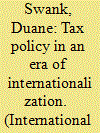

|
|
|
|
|
| Publication |
2006.
|
| Summary/Abstract |
I offer an explanation for the widespread diffusion of neoliberal tax policies in the developed democracies. After accounting for the policy influences of commonly experienced domestic and international forces, I consider several plausible paths of diffusion of neoliberal tax structure. My central argument is that the highly visible 1980s market-conforming tax reform in the United States should be especially important in shaping subsequent tax policies in other polities. There are substantial reasons to believe, however, that domestic political and institutional forces will shape policymaker assessment of the benefits and costs of neoliberal reforms: the strength of right parties and the degree to which the median voter has moved right should condition adoption of neoliberal tax policy; the institutions of national and sector-coordinated capitalism should also slow the enactment of neoliberal tax reforms. I assess these arguments with empirical models of 1981-98 tax rates on capital in sixteen nations. I find that changes in U.S. tax policy influence subsequent reforms in other polities; in the long term, all nations move toward the U.S. neoliberal tax structure. Analysis also shows, however, that the short-term responsiveness to U.S. tax reforms is notably greater where uncoordinated market institutions are dominant. Theory and extensive qualitative and quantitative evidence indicate that pressures to compete for mobile assets, as balanced against the economic and political costs of adoption, anchor the process of diffusion of neoliberal tax policy. There is little evidence for the view that systematic policy learning or social emulation drove tax policy diffusion.
|
|
|
|
|
|
|
|
|
|
|
|
|
|
|
|
| 9 |
ID:
100121
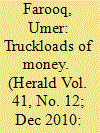

|
|
|
| 10 |
ID:
133531
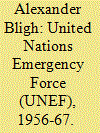

|
|
|
|
|
| Publication |
2014.
|
| Summary/Abstract |
With the conclusion of almost every round of hostilities between Israel and one of its neighbours the idea of international forces is being raised once again. This is basically an improved and revised initiative for stationing international forces to supervise (and perhaps impose) a ceasefire between the parties. In the Arab-Israeli framework, it is in essence the old approach which has been in service since 1948. Only one force, UNEF, stands out as not having been approved by the Security Council and clearly failing its intended but vaguely defined mission. The current analysis leads to the conclusion that in this particular regional conflict, the positioning of international forces must always come within the context of a more comprehensive settlement. That way, by violating a force's mandate, each party would lose either land or diplomatic recognition. Moreover, if a Middle Eastern peacekeeping operation is to take place in the future, it has to include organic units of the warring parties, encouraging peaceful interactions. Such units should reinforce organic units from countries acceptable to all parties. Hopefully, future missions, taking into consideration some of the approaches suggested here, can continue to contribute to regional processes for peace.
|
|
|
|
|
|
|
|
|
|
|
|
|
|
|
|